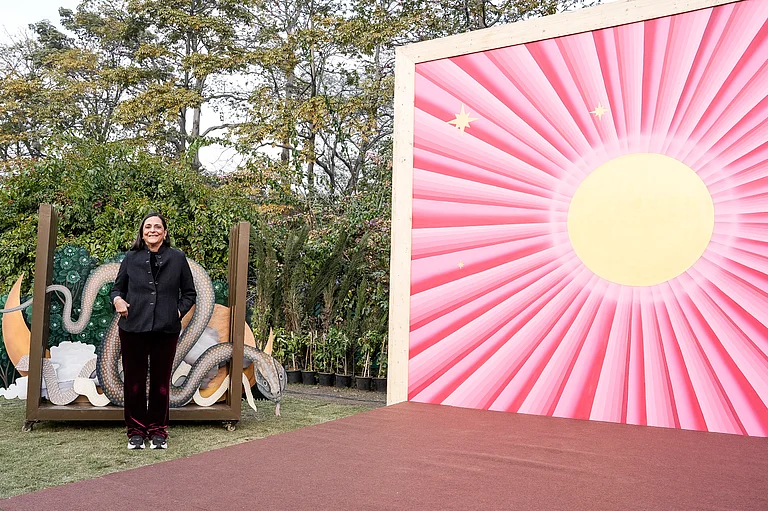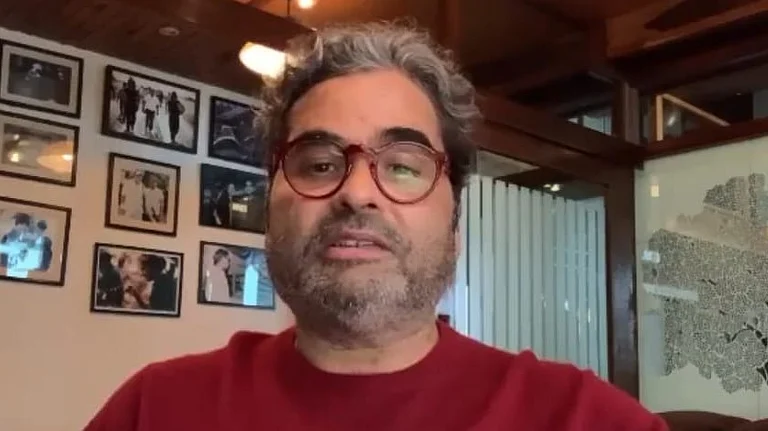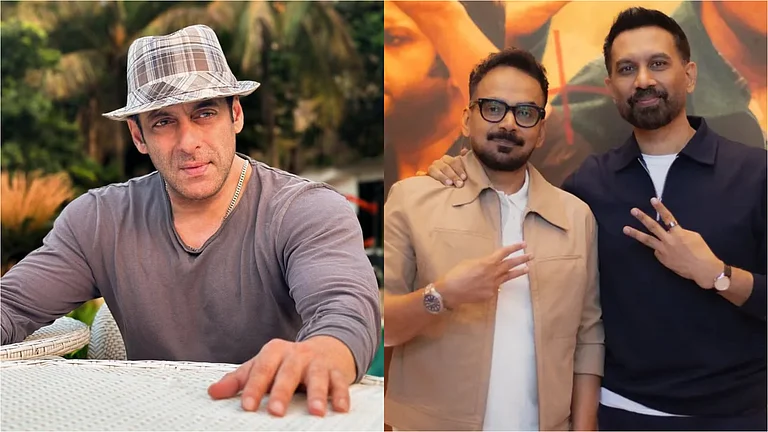At first, director-duo Raj Nidimoru & Krishna DK’s Happy Ending (2013) was set in Mumbai. It was conceptualised around a ‘hack writer’ (as Nidimoru puts it) wearing an AC/DC t-shirt and slippers, living around Carter Road (in Bandra), spending his time in the area’s coffee shops and DVD libraries. The script’s modest setting and intimate flavour was abandoned once Saif Ali Khan agreed to star in and co-produce the film, under his banner Illuminati Films. Having made their earlier films on a controlled budget, this was the duo’s first advent into a ‘studio film’. Mumbai became Los Angeles, the duo shot their first lip-sync song, and it was (thankfully) among the last attempts by Khan to play a youngish bachelor in a foreign country (which he had done in Love Aaj Kal (2009) and Cocktail (2012) – incidentally both produced by Illuminati films).
“Happy Ending was the first of our films that had the ‘packaging’: song & dance, romance etc. It was a huge learning experience,” says Nidimoru. The duo wrote their disoriented headspace into the film, where the protagonist (Khan) has an alter-ego called Yogi (also played by Khan, in a fat-suit and sporting a long, true-artist beard) talking into the protagonist’s ear whenever he’s being disingenuous. Despite its quirks, Happy Ending was Raj & DK’s first publicised failure. They’d been making films for more than a decade by then, but this was their first film that mattered to the trade. Happy Ending’s failure kickstarted a learning curve that culminated into the critical and commercial success of Stree (2018). In the last six years, the director-duo have been beacons of filmmakers preserving their indie spirit, arrogance, authorial voice among suits, with a streak of four ‘hits’ (including Farzi, India’s most-watched show on an OTT service).
In a world where indie filmmakers are cast aside after one failed studio project (recently there was concern around Vasan Bala’s future at Dharma following Jigra’s tepid box office response), Raj-DK are in an enviable position. With complete creative control over their projects, where they’re allowed to be as eccentric as they want, the duo could arguably negotiate any budget they desire. Two of their upcoming shows – Gulkanda Takes and Rakht Brahmand are billed to be fantasy, VFX-heavy and marquee projects for the respective platforms.
Over three phone calls—while navigating the production chaos on the sets of an upcoming show—Nidimoru reflects on how the duo has charted their way through a volatile business and come out on top. Edited excerpts:
Was Go Goa Gone (2013) considered a hit? What was the mood like on the Monday when you woke up to the weekend numbers?
The budget of that film was anywhere around Rs 7 Cr. I think we did around 6-7 Cr in the first week. So, anything after that is a success for a film that size. Shor in the City (2011) was made for Rs 2.5 Cr. We could make the film we wanted.
I think one of the reasons we made an impression is because we didn’t come with the hype around us. We were a part of the audience’s discovery.
I’m assuming the aftermath of Happy Ending (2014) must’ve hit harder.
Happy Ending was our first studio film. It was such an indie film idea. A former star hires this writer because he thinks he’s a good hack, and hands him two DVDs to copy. The writer says forget these two films, I’ll plagiarise from 50-odd films, so people will also won’t be able to say kidhar se uthaya hai(where it’s lifted from). It was an ode to the Bombay we’d lived in. But then, the location of the film changed to a foreign country, and we put songs in it. So, we chose to put this transformation into the film with the character of Yogi—an alter-ego who knows all the tropes of a rom-com. Happy Ending was probably too self-aware as a film.
We knew the compromises all along, and we were still trying to crack it. This is why we infused it with meta commentary. Most industry folk do tend to dumb it down while working on bigger budgets, but I think we didn’t do that. We gave in a bit, and put in our first lip-sync song, but I think it’s still a smart film. It’s somehow caught on now, because whenever we put out an anniversary post for Happy Ending, it gets as much engagement as Go Goa Gone.
I remember this tweet you wrote about how you started writing Stree (2018) on the weekend after A Gentleman (2016) tanked. Can you tell me about your state of mind when your careers were on the line?
A Gentleman was our take on a ‘popcorn film’. We were trying to make a crime comedy with a twist that comes at the interval point. I think more people would’ve enjoyed it if we had made it at the budget of a 99 (2009). But that was one lesson here—the packaging will always get more focus than the film. We knew before Friday that A Gentleman wasn’t going to do well, because it wasn’t tracking well. It was strange because people hadn’t even seen the film yet. It was probably coming in a bit heavy, and it opened at the same numbers as Go Goa Gone. I completely gave up on the film by Friday night and started work on Stree by Saturday.
After A Gentleman, were you conscious about working with tighter budgets so you could have creative control?
Budgets are a follow-up conversation. Our first priority was to write things that couldn’t be altered or diluted. We wanted to make our own films, like we’d done during the early part of our careers. We kept reminding ourselves about how we started on our own, and that we should get back in that mindset. At first, we were producing Stree ourselves—we began crewing up, casting Rajkummar (Rao), Pankaj (Tripathi), looking for a director. There was no studio initially—it was DK and me out of a coffee shop.
At what point did Maddock Films (Dinesh Vijan) enter the picture?
Maddock films entered much later. We were in talks with another studio, and they were delaying it. There was a very specific window we wanted to make Stree in, because I wanted to be on set before we started work on Family Man. When the delay happened, we serendipitously bumped into Dinesh Vijan at a screening and that's how Maddock entered the picture.
What’s a way to preserve one’s authorial voice and instincts in this line of work? Can you only do it after being successful? Is it a bit of a chicken and egg situation?
It’s a hard sell, even now. You might want a particular actor for a part, but they might not get it. I remember after Shor In the City, many people called us. And we told them we want our next film to be about slackers and zombies. Most of them thought we were either a flash in the pan, or we’d lost it.
There’s a fear among producers for the ‘new’. They want familiar stories, which will run like a well-oiled machine. I have to give kudos to the actors, who chose to work with us after reading the script; not judging us by our track record.
There’s always the self-belief that we can make it on our own. That’s how we started off. If a Go Goa Gone costs Rs 5 Cr to make, we’ll find a way to make it in Rs 2 Cr. But we’ll do it ourselves. When you’re assured about this, you can walk into the studio offices with less to lose.
After two commercial failures, was there a point where you second-guessed your instincts?
Hearing that we were ‘ahead of our times’ for our early films felt like a backhanded compliment. We’ve always been confident that we can’t make a ‘bad’ film: one that is lazily written, one that has only tropes, where we’re repeating ourselves. And that’s because these things are in our hands.
Even after A Gentleman, we had many offers to do a part 2 or a part 3 in anything. But we saw no glory in it. Especially, if it’s worked earlier and if my only credit is to not muck it up.
What’s a piece of advice you would give to filmmakers negotiating with studios?
I tell many young filmmakers, when they meet me: make what you can make. Find a way to shoot it, and do it with whatever you can spare, raise. Do it with an iPhone, your friends. Our mantra has always been that—for any new project I’ll talk to a couple of studios; if it feels like it’s not working out, then we start planning about doing it ourselves.
Do you think being on OTT has played a part in your phenomenal success – is a pitch meeting for a theatrical a different beast?
Of course, OTT has a major role to play in our success in the last few years. But we don't think that a pitch meeting for a theatrical feature will be any different. Especially, with Stree in our canon, I think we'll only have more ammunition at our disposal for when we get back to directing feature films from next year onwards.




























